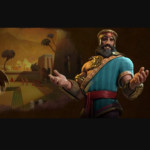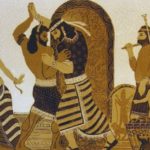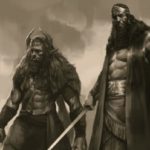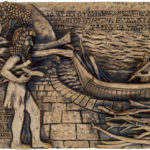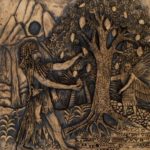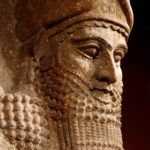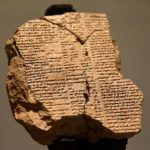The word is thrown around so much these days that it, like ‘awesome’, has lost nearly all its original meaning. “Dude, that’s epic!” No; no, it is not. Whatever it was, it was slightly entertaining. That is what you should have said. Very little is epic anymore.
-
a long poem, typically one derived from ancient oral tradition, narrating the deeds and adventures of heroic or legendary figures or the history of a nation.
synonyms: heroic poem; story, saga, legend, romance, chronicle, myth, fable, tale“the epics of Homer”-
the genre of epic poems.“the romances display gentler emotions not found in Greek epic”
-
a long film, book, or other work portraying heroic deeds and adventures or covering an extended period of time.“a Hollywood biblical epic”
synonyms: long film; informalblockbuster“a big Hollywood epic”
-
-
relating to or characteristic of an epic or epics.“England’s national epic poem Beowulf“
synonyms: heroic, long, grand, monumental, Homeric, Miltonian “a traditional epic poem”-
heroic or grand in scale or character.“his epic journey around the world”
synonyms: ambitious, heroic, grand, great, Herculean; very long, monumental;adventurous“their epic journey” -
INFORMALparticularly impressive or remarkable.“the gig last night was epic”
-
Early epics tended to involve the rarest of courage against nearly unimaginable odds, as well as, in the process of surmounting those odds, crossing continents and/or oceans. The feats featured in such epics became, in modern times of universal mediocrity and programmed self-doubt, regarded as myths, not facts; to the man who has never even walked across his own town, how could one ever hope to walk so much more –and for days? To the man who has never stood up for himself against a big bully in his life, how could anyone really stand up to a giant, an army, or a god? To the man who has always lived amongst, and only ever heard about, people who die before 100, how could there be anyone in history who is healthier and longer-lived? Epics were about people who surpassed all those things and more.
The Epic of Gilgamesh is a prime (and arguably the oldest known) example of a such a tale; its main character is the king of the ancient city Uruk, which grew into what is today the nation of Iraq (pronounced almost identically if you ask the locals, which I have –in person, in Iraq). His mother is an actual goddess, and converses with other still-living deities on his behalf. He travels for a week to reach the forest where the gods live, and defeats an almost ageless immortal giant guarding that forest, then going on to turn down a goddess trying to become his lover, killing the giant bull she has another god send rampaging after him and through much of the Middle East, even though it changed rivers and killed hundreds or even thousands of other men, and finally goes in search for the secret of eternal life, of all things, which takes him to the only two immortal humans, both of which survived the biblical flood; yes, he meets Noah and his wife, still alive after a thousand years and nine generations of grandkids. But wait; there’s more.
“Gilgamesh crosses a mountain pass at night and encounters a pride of lions. Before sleeping he prays for protection to the moon god, Sin. Then, waking from an encouraging dream, he kills the lions and uses their skins for clothing. After a long and perilous journey, Gilgamesh arrives at the twin peaks of Mount Mashu at the end of the earth. He comes across a tunnel, which no man has ever entered, guarded by two scorpion monsters, who appear to be a married couple. The husband tries to dissuade Gilgamesh from passing, but the wife intervenes, expresses sympathy for Gilgamesh, and allows his passage. He passes under the mountains along the Road of the Sun. In complete darkness he follows the road for 12 “double hours”, managing to complete the trip before the Sun catches up with him. He arrives at the garden of the gods, a paradise full of jewel-laden trees.
Gilgamesh meets alewife Siduri, who assumes that he is a murderer or thief because of his disheveled appearance. Gilgamesh tells her about the purpose of his journey. She attempts to dissuade him from his quest, but sends him to Ur-shanabi the ferryman, who will help him cross the sea to Utnapishtim. Gilgamesh, out of spontaneous rage, destroys the stone charms that Ur-shanabi keeps with him. He tells him his story, but when he asks for his help, Ur-shanabi informs him that he has just destroyed the objects that can help them cross the Waters of Death, which are deadly to the touch. Ur-shanabi instructs Gilgamesh to cut down 120 trees and fashion them into punting poles. When they reach the island where Utnapishtim lives, Gilgamesh recounts his story, asking him for his help. Utnapishtim reprimands him, declaring that fighting the common fate of humans is futile and diminishes life’s joys.
Gilgamesh observes that Utnapishtim seems no different from himself, and asks him how he obtained his immortality. Utnapishtim explains that the gods decided to send a great flood. To save Utnapishtim the god Ea told him to build a boat. He gave him precise dimensions, and it was sealed with pitch and bitumen. His entire family went aboard together with his craftsmen and “all the animals of the field”. A violent storm then arose which caused the terrified gods to retreat to the heavens. Ishtar lamented the wholesale destruction of humanity, and the other gods wept beside her. The storm lasted six days and nights, after which “all the human beings turned to clay”. Utnapishtim weeps when he sees the destruction. His boat lodges on a mountain, and he releases a dove, a swallow, and a raven. When the raven fails to return, he opens the ark and frees its inhabitants. Utnapishtim offers a sacrifice to the gods, who smell the sweet savor and gather around. Ishtar vows that just as she will never forget the brilliant necklace that hangs around her neck, she will always remember this time. When Enlil arrives, angry that there are survivors, she condemns him for instigating the flood. Ea also castigates him for sending a disproportionate punishment. Enlil blesses Utnapishtim and his wife, and rewards them with eternal life.
Utnapishtim challenges Gilgamesh to stay awake for six days and seven nights. Gilgamesh falls asleep, and Utnapishtim instructs his wife to bake a loaf of bread on each of the days he is asleep, so that he cannot deny his failure to keep awake. Gilgamesh, who is seeking to overcome death, cannot even conquer sleep. After instructing Ur-shanabi the ferryman to wash Gilgamesh, and clothe him in royal robes, they depart for Uruk.
As they are leaving, Utnapishtim’s wife asks her husband to offer a parting gift. Utnapishtim tells Gilgamesh that at the bottom of the sea there lives a boxthorn-like plant that will make him young again. “There is a plant that looks like a box-thorn, it has prickles like a dogrose, and will prick one who plucks it. But if you can possess this plant, you’ll be again as you were in your youth.” Gilgamesh, by binding stones to his feet so he can walk on the bottom, manages to obtain the plant. Gilgamesh proposes to investigate if the plant has the hypothesized rejuvenation ability by testing it on an old man once he returns to Uruk. “This plant, Ur-shanabi, is the “Plant of Heartbeat”; with it a man can regain his vigor. To Uruk-the-sheepfold I will take it; to an ancient I will feed some and put the plant to the test!”
Unfortunately, when Gilgamesh stops to bathe, it is stolen by a serpent, who sheds its skin as it departs. Gilgamesh weeps at the futility of his efforts, because he has now lost all chance of immortality. He returns to Uruk, where the sight of its massive walls prompts him to praise this enduring work to Ur-shanabi.”
Gilgamesh even goes on to reconnect with his friend, Enkidu, who had become trapped in the underground realm of the dead. Gilgamesh contacted multiple deities to this end, and got responses from them; more than just assumed answers to his prayers, they gave him direct communication and then some. And let’s not forget that Noah himself gave him the exact location of one of the pre-flood plants, now underwater with the changed ocean levels, which the pre-flood peoples had eaten to maintain their immortality; perhaps not realizing it at the time, Gilgamesh had been given information about immortal plants which bestowed immortality. In other words? There were things even the global flood had not been able to kill.
THAT is what epic means; doing all of THAT. Gilgamesh was epic. His journey was epic. Many other ancient accounts and legends are epic like his was. Literally. It is okay, accurate, and understandable to say that about them.
I have lived an epic life, similar here and there to Gilgamesh’s, though that was never initially my plan. I have crossed part of South America twice, the Convergence Zone twice, the Pacific four times, Europe six times, the Middle East six times, and the Atlantic ten times. I have arrived on the shores of the Arctic and Africa, and found ancient and unknown ruins around the world, several times entering tunnels no one else may ever have. I have sailed into the Bermuda Triangle, and swam part of the Grand Canyon. My first trip to Asia took me to the legendary Mt. Fuji. And I have crossed the North American continent more times than I have been able to keep track of –literally; I have crossed it on land and in the skies, back and forth, up and down, this way and that, practically covering it in a plaid mesh of my travels and relocations, making it to every state multiple times, and driving through Canada twice, not counting my first trip there (driving from San Diego to Vancouver and back). All told, as you may have seen on the home-page of this site of mine, I have made hundreds of trips over decades to 6 continents, 57 nations, all 50 states, and more than 10,000 cities and towns. My second-longest journey took six days, and was to a great forest where gods are said to dwell. My longest so far took a month and nearly showed me every single country across all of Europe. I have also completed heavy research, grueling training, and detailed plans to cross the Arctic Ocean, the Indian Ocean, the Southern Ocean, and my final continent, Antarctica, as well as what lies beyond.
I have had to face and overcome a wide variety of hostile beings along this lengthy journey to every continent and land on Earth, including a good number who thought of themselves as deities, some even claiming the names of deities as their own. I have crossed mountain passes at night, hunted by mountain lions. I have more than once used the Going-to-the-Sun Road. I have turned down goddess-level beauties across multiple continents for misbehaving to me and other lovers. I have been on hundreds of combat missions, covering tens of thousands of miles, and afterward helped teach and train tens of thousands of warriors about to go through the same. I have become good friends and adventure-buddies with those I once fought. I have hiked up and summited mountains in sandals and barefoot, climbed up tall buildings, and even jumped off a few. I have dealt with beasts and wild animals, packs and herds, scorpions and camel spiders, and many other things in between. I have gone underground and appeared disheveled when returning to various civilizations, having to explain my appearance to strange and primitive people who had become too senses-blinded to understand. I have sought ancient and immortal people, as well as the secret of eternal life. (Who wouldn’t?) I have felled many trees, and fashioned them into things (thankfully planting and caring for many more). I have stayed awake for days and nights on end, completed vision and dream quests, and returned to Uruk/Iraq by choice. I have prepared to go to the bottom of the oceans, and already, in that preparation, studied as much of them as is known. And, yes, I have found plants which vastly improve and increase lifespans, as well as restore incredible amounts of health, curing all disease. As for contacting deities and the dead, I’ll leave that up to them to share or not share with you, for who would believe any man who made such a claim without their evidence and testimony from the other side? And, of course, I am the king of a special city, it being well-walled not unlike legendary Uruk.
Will they write the Epic of Austin one day, and chisel it into clay and stone tablets? I don’t know. Here it is in liquid crystal displays, fashioned there by pixels and electrons for now, though. I hope you find inspiration in it and enjoy. More to come; nine more books’ worth, well underway.
